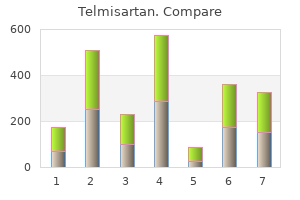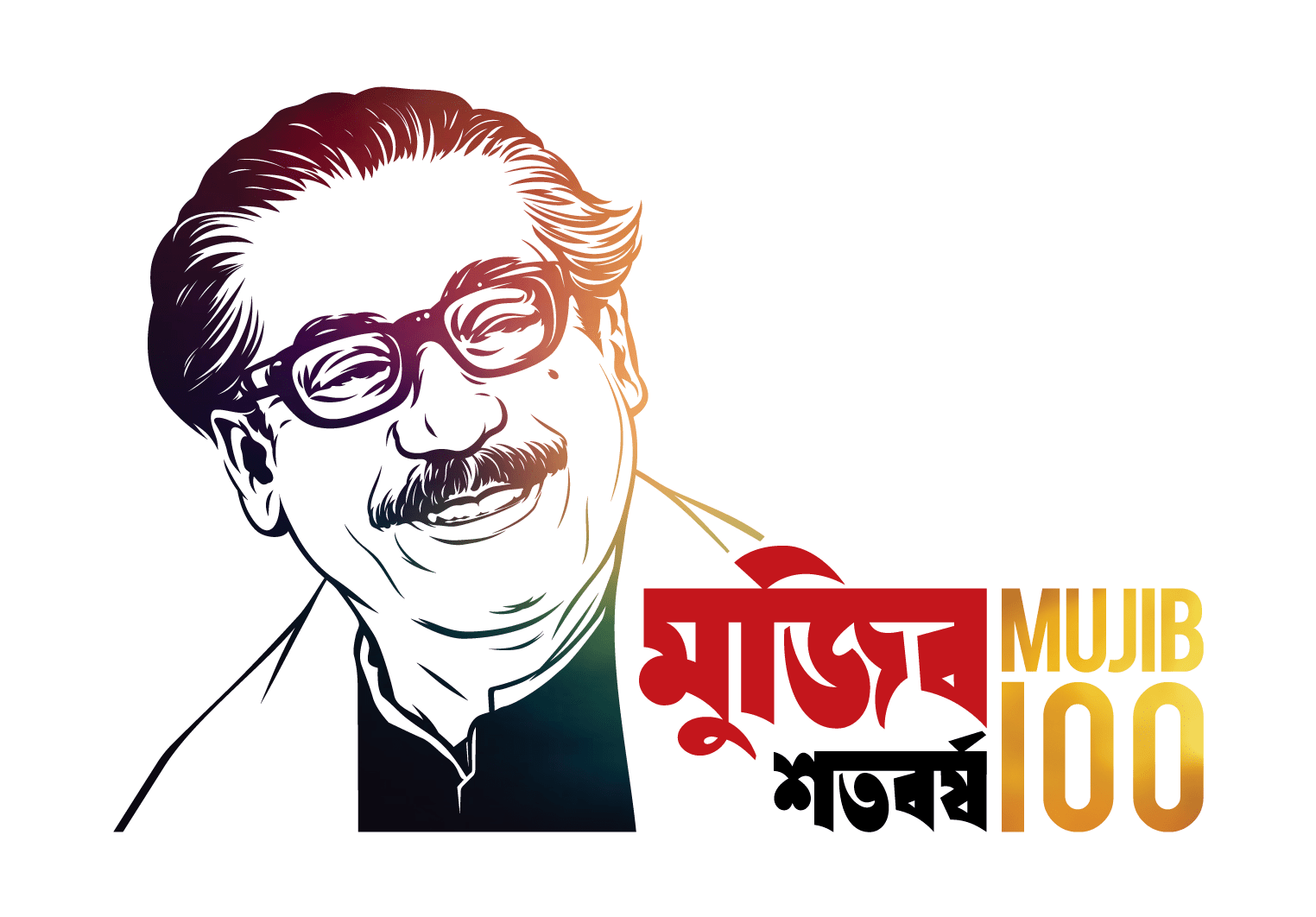"Order telmisartan us, blood pressure yogurt".
By: O. Kafa, M.A., M.D., M.P.H.
Co-Director, Mayo Clinic Alix School of Medicine
On September 16 hypertension causes generic telmisartan 80mg line, 1973 prehypertension causes discount telmisartan online visa, he voluntarily reported to the Telecommunications Regiment blood pressure ranges by age purchase telmisartan 20mg overnight delivery. This Commission holds the conviction that the process by which these people were sentenced in this tribunal was illegal prehypertension 120 80 discount telmisartan 20 mg mastercard. The grounds for that conviction are the following points, above and beyond those characterizing all such trials: * the judges were not unanimous in their decision. In the sentence it is pointed out that the specially appointed judgeadvocate "was in favor of sentencing the accused to ten years in prison without the possibility for parole since he believed that in this case it was appropriate to apply the norms of Article 107 of the Criminal Code inasmuch as this was simply an attempt, and they had in their favor the extenuating factor of their previous blameless conduct. These four people on trial were sentenced for having committed the crime contemplated in Article 245, No. At that time the former read: "The member of the military who entices Chilean troops or any troops serving the Republic to go over to enemy ranks or to desert the flag in time of war is to be punished with the most severe military punishment, namely death. The sentence itself makes that clear in consideration 3: "That these actions, in the judgment of the war tribunal, constitute the crime described in Articles 245 No. In this regard, it should be kept in mind that the evidence it has received enables this Commission to state that torture was used systematically during the interrogations that were conducted at the Pisagua prison camp, and hence in this case such proof is invalid. Even though there was a moral and legal obligation to turn over the bodies, their relatives never received them. Some of the relatives of those condemned to death received a letter from the Sixth Army Division dated October 30, 1973, in which they were told that". This Commission holds the conviction that Rodolfo Fuenzalida, Freddy Taberna, Juan Ruz, and Josй Sampson were executed by government agents in a procedure that, owing to a lack of due process of law, violated the rules for safeguarding the human rights of people on trial. He was arrested September 23 by army troops, and was taken to the Telecommunications Regiment and then to the Pisagua prison camp. He goes on to say that his own work in this organization was to prepare molotov cocktails and another kind of explosive. Thus the defendant Palominos has violated the provisions of the Law of Internal State Security. Consequently since the defendant Palominos has confessed that he was involved in the actions mentioned, he must be punished with the greatest severity. His relatives had received the army notification mentioned above telling them that after execution he 349 had been given Christian burial in the Pisagua cemetery. This Commission holds the conviction that German Palominos was executed by government agents on the basis of a trial that ignored the legal norms then in effect. He was arrested January 5, 1974, and taken to the Telecommunications Regiment and from there to the Pisagua prison camp. For the reasons of a more general nature that have already been mentioned with regard to war tribunals, and particularly for the following reasons it can be established that in this trial a number of irregular procedures took place in disregard for the basic rights of Yбсez and Toro. These maneuvers were called Plan 22 and their execution was to involve occupying twenty centers regarded as vital to the city of Iquique such as churches, public buildings, factories, and so forth. The plan also contemplated seizing customs vehicles and weapons from the prison service so as to reinforce the 350 execution of the plan. In order to obtain more arms, the El Colorado police checkpoint and Infantry Regiment No. The court record states, "The tribunal rejects such arguments because besides confession there are other proofs that a crime has been committed. Given the evidence mentioned, this Commission has come to the conviction that Luis Toro and Alberto Yбсez were executed by government agents after a war tribunal which, in departing from the basic requirements of due process, violated the human rights of the accused. Reading and analyzing the sentences of these war tribunals as well as the statements by lawyers who were involved in them, this Commission has been able to come to a conviction about the irregularities common to some of them, which we will now mention: * With regard to the defense, the legislation then in effect provided that the defender should state the defense in writing and indicate the means of proof he or she intended to employ and the list of witnesses and experts who were to testify. Articles 183, 184, 189, 190, 191 and other articles of the Military Justice Code then in effect granted all the guarantees and time periods the defense might need. The code even allowed the possibility of offering the proof either in the place where the tribunal was in session or elsewhere, in which case one of its members was to be delegated for that purpose. They were able to converse with the people they were defending for only a few moments and often they could not even contact them, since they had been officially appointed to defend a large number of defendants. Furthermore, Pisagua was a camp for prisoners of war and so only members of the armed forces and the defense lawyers were allowed access. Hence it was impossible for witnesses to enter, and that made it much harder to establish that the previous conduct of the accused had been blameless, an extenuating circumstance that should have affected the punishment being applied. According to what the lawyers say, at least in the second and third tribunals a statement sworn before a notary in which witnesses declared that the previous conduct of those on trial had been blameless was presented, but the tribunal rejected it as not in accordance with the law.
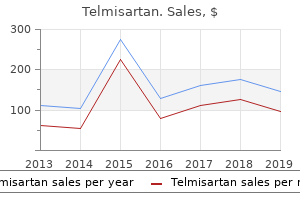
The concluding phrase of the definition of crimes against humanity blood pressure medication used for opiate withdrawal cheap telmisartan 20 mg overnight delivery, which is i n the ~Zternative blood pressure numbers chart buy telmisartan 20 mg lowest price, makes it quite clear that crimes by Germans against Germans are within the jurisdiction of this Tribunal hypertension medications order generic telmisartan on-line. It reads "or persecutions on political blood pressure medication depression side effects buy genuine telmisartan online, racial, or religious grounds whether or not i n violation of the domestic laws of the cowntry where perpetrated. This has particular reference to crimes against humanity, since the application of crimes against peace and war crimes, while possible, is almost entirely theoretical. I f the occupying power fails to authorize German courts to try crimes committed by Germans against other Germans (and in the American zone of occupation no such authorization has been given), then these cases are tried only before non-German tribunals, such as these Military Tribunals. What would be the effect of a holding that crimes by Germans against Germans can under no circumstances be within the jurisdiction of the Tribunal? I s this Tribunal to ignore the proof that tens of t,housands of Germans were exterminated pursuant to a secret decree, because a group of criminals in control of a police state thought them "useless eaters" and an unnecessary burden, or that German prisoners were murdered and mistreated by thousands in concentration camps, in part by medical experimentation? Military Tribunal I1 in the Milch case held that crimes against nationals of Hungary and Romania were crimes against humanity. There is certainly no reason in saying that there is jurisdiction over crimes by Germans against Hungarians but not against, Germans. The judgment of the International Military Tribunal shows a clear recognition of its jurisdiction over crimes by Germans against Germans. After reviewing a large number of inhumane acts in connection with war crimes and crimes against humanity, the Tribunal concluded by saying t h a t "* * * from the beginning of the war in 1939 war crimes were committed on a vast scale, which were also crimes against humanity; and insofar as the inhumane acts charged in the indictment, and committed after the beginning of the war, did not constitute war crimes, they were all committed in execution of, or in connection with the aggressive war, and therefore constituted crimes against humanity. Moreover, the prosecu- tion in that case maintained that the inhumane treatment of Jews and political opponents in Germany before the war constituted crimes a,gainst humanity. The Tribunal said in this connection- "With regard to crimes against humanity there is no doubt whatever that political opponents were murdered in Germany before the war, and that many of them were kept in concentration camps in circumstances of great horror and cruelty. The policy of terror was certainly carried out on a vast scale, and in many cases was organized and systematic. The policy of persecution, repression, and murder of civilians in Germany before the war of 1939, who wero likely to be hostile to the government, was most ruthlessly carried out. It held that such acts were not crimes against humanity, as defined by the Charter, not because they were crimes against Germans, but because they were not committed in execution of, or in connection with, aggressive war. Indeed, the Tribunal went on to hold that the very same acts committed after the war began were crimes agzinst humanity. No distinction was drawn between the murder of German Jews and Polish or Russian Jews. And, moreover, no distinction was drawn between criminal medical experimentation on German and non-German concentration camp inmates or the murder of German and non-German civilians under the Euthanasia Program. The decision of this question is of particular significance since the medical experiments with which the defendants are charged and the mercy killings executed were, in the first place, carried out on German nationals. The question here is not to establish whether such acts are against humanity but whether they are crimes against humanity punishable according to Law No. I f measures taken against German nationals do not come under the law, the evidence of the prosecution to be examined is restricted mainly to those cases in which certain foreigners were affected, and in addition, evidence must be produced proving that the defendant was aware of the fact that foreigners too had actually been involved by these measures. This has been expressly stressed in the introduction, and beyond that the London Statute and the Moscow Declaration of 30 October 1943 have been declared inseparable components of the law according to Article I. The legally pre-eminent London Statute therefore is decisive for the interpretation of the substantive law. Article 6 (c) of this statute provides that crimes against humanity can be considered punishable only if they were committed "in execution of or in connection with any crime within the jurisdiction of the Tribunal * * *". This jurisdiction, however, extends only to crimes against peace and to war crimes. The clause is to signify that the Tribunal is not to deal with individual crimes but only with such crimes as have been committed on a large scale and are therefore within the jurisdiction of the trial. This meaning of the clause was not apparent to the International Military Tribunal, the prosecutors of the signatory powers at that time, nor to those who later commented on the verdict, and I do not *United States va. T h e high awthority of tlie International Military Tribunal is emphasized by Ordinance 7, Article X, according to which its actual findings are binding for the later courts. This International Military Tribunal, however, has ruled that the punishable crime against humanity is a dependent, subsidiary crime and that it can only be considered a crime if it has been committed in connection with a war crime or a crime against peace. The verdict of the International Military Tribunal l in rejecting the criminality of crimes against humanity committed prior to the war states the following: "The Tribunal is of the opinion that revolting and horrible as many of these crimes were, it has not been satisfactorily proved that they were done in execution of, or in connection with, any such crime. Professor Donnedieu de Vabres, the French judge of the International Military Tribunal, expressed his attitude to this limitation of the punishable crime against humanity after the pronouncement of the verdict in a lecture quoted by the prosecution in the Flick case; his opinion can be considered important. The French judge deplores the limitation of the crime against humanity, but he confirms it.
In the later period (beyond 180 days after transplantation) blood pressure taking 40 mg telmisartan visa, infection risks depend on immunosuppression and exposures arteria music buy cheap telmisartan 40mg on-line. Confirm bacterial etiology before antibiotic Rx Acute bacterial pharyngitis Benzathine penicillin amoxycillin or or Piperacillintazobactam Head & Polymicrobial heart attack 720p kickass buy discount telmisartan 40 mg line, Clindamycin neck space S arrhythmia technologies institute greenville sc purchase telmisartan 40mg on-line. Duration 3-4 weeks Collect urine or preferably prostatic fluid for culture before antibiotics Co-trimoxazole Table 11. Standard doses of antimicrobial agents for Post-operative infections following solid organ transplant Antibiotics Piperacillin-tazobactam Cefoperazone-sulbactam Imipenem-cilastatin Meropenem Vancomycin Doses and duration 4. Bacterial profile and patterns of antimicrobial drug resistance in intra-abdominal infections: Current experience in a teaching hospital. A study of ventilator-associated pneumonia: Incidence, outcome, risk factors and measures to be taken for prevention. Changing Trends in Antimicrobial Susceptibility and Hospital Acquired Infections Over an 8 year Period in a Tertiary Care Hospital in Relation to Introduction of an Infection Control Programme. Central venous catheter-related blood stream infection rate in critical care units in a tertiary care, teaching hospital in Mumbai. Gahlot R, Nigam C, Kumar V, Yadav G, Anupurba S, Gahlot R, Nigam C, Kumar V, Yadav G, Anupurba S. The symptoms include fever, pelvic pain, dyspareunia and abnormal vaginal discharge. Presence of cervical motion tenderness or uterine tenderness or adnexal tenderness on clinical examination 4. There is evidence that the cervical region and surrounding uppermost part of the vaginahavefewer anaerobes and aerobes of the proteobacteria class, which are responsible for the majority of infections. These organisms are part of the vaginal flora and are introduced into the upper genital tract coincident with vaginal examinations during labour and/or instrumentation during surgery 12. Results of laboratory tests should be checked and the microbiologist consulted to ensure optimum antimicrobial therapy. After a single dose, therapeutic drug level is maintained for 3-4 hours; repeat dose if the duration of surgery is >3 hours or blood loss is >1500 ml. Tita et al showed the addition of 500 mg azithromycin to cefazolin for caesareans (in labour or with membranes ruptured) reduced endometritis & wound infection significantly (6. An additional dose is given 3 hours after the initial dose if a surgical procedure is lengthy. Here, the infection may be reduced by instituting all measures for surgical prophylaxis, pre-operative use of oral antibiotics and mechanical bowel preparation, and newer measures being added like a change of gloves and instrument tray prior to skin closure. The care of women requesting induced abortion [Evidence-based clinical guideline no. Placebo-controlled, doubleblind, randomized study of prophylactic antibiotics in elective abdominal hysterectomy. Outcomes Associated With a Five-Point Surgical Site Infection Prevention Bundle in Women Undergoing Surgery for Ovarian Cancer. Using Bundled Interventions to Reduce Surgical Site Infection After Major Gynecologic Cancer Surgery. Wound complications in patients with carcinoma of the vulva: Comparison between radical and modified vulvectomies. Vascular phenomena, major arterial emboli, septic pulmonary infarcts, mycotic aneurysm, intracranial hemorrhage, conjunctival hemorrhages, and Janeway lesions 4. Immunological phenomena glomerulonephritis, Osler nodes, Roth spots, and rheumatoid factor 5. Recommended prophylaxis for high-risk dental procedures in high-risk patients includes amoxicillin or ampicillin 50 mg/kg orally or i. Implications for diagnosis and treatment of infective endocarditis: Eight year experience of an Infectious Diseases Team in a private Tertiary care centre. Intravascular stent-related endocarditis due to rapidly growing mycobacteria: A new problem in the developing world. Characteristics of infective endocarditis in a developing country-clinical profile and outcome in 192 Indian patients, 1992-2001.
Buy cheap telmisartan 40 mg online. Xiaomi IHealth rozpakowanie i działanie PL.
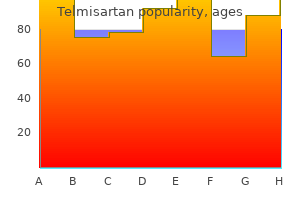
Pretending to reach for his documents hypertension journals order 40mg telmisartan mastercard, the man took out a gun and shot Lagos point blank blood pressure medication vasodilators safe telmisartan 20mg, killing him on the spot arteria zygomaticoorbitalis telmisartan 80mg online. Since he was carrying out his duties blood pressure medication vivid dreams order telmisartan cheap, and since other evidence examined makes it possible to state that the perpetrator was a member of the Manuel Rodrнguez Patriotic Front, this Commission came to the conviction that the detective Hugo Lagos was killed by a member of the Manuel Rodrнguez Patriotic Front who violated his human rights. That same day there was a series of other explosions in the city that alarmed the population. Since he was carrying out his proper responsibilities of guarding public order in that area and since a series of explosions was set off that same day, this Commission has come to the conviction that the fundamental rights of First Corporal Manuel Gonzбlez were violated by politically motivated private citizens. At that moment, a group of unknown armed persons attacked him, and he was hit by six bullets and died on the spot. Since the manner in which he was killed made it impossible for this policeman to defend himself, and since the perpetrators took his weapon and painted slogans on the walls, this Commission has come to the conviction that the killing of Patricio Rodrнguez was a human rights violation committed by politically motivated private citizens. February 5, at the intersection of Calles Eyzaguirre and Santa Rosa in the district of Santiago a bomb explosion hit the police bus in which he was riding. The evidence examined makes it possible to conclude that: * An action like this can only be understood as an attempt to create a public disturbance; * Judging from the way it was carried out, it can be concluded that its perpetrators believed that violence is a way to attain political objectives; * the police officers were completely defenseless, and the perpetrators were acting at little risk. In view of the evidence this commission holds the conviction that Second Sergeant Luis Rival died a victim of the violation of his fundamental rights committed by politically motivated private citizens. The lieutenant received a bullet wound in the clavicle and died while being taken to the police hospital. The evidence gathered leads to the conclusion that: * He was killed while protecting public order and in a situation of antigovernment political demonstrations; and * the fact that the shot was fired while he was leaving the area suggests that the purpose was to kill a policeman without allowing him any chance to defend himself. The existing evidence allows this Commission to come to the conviction that the killing of Lieutenant Alfonso Rivera was a violation of his human rights committed by politically motivated private citizens. This information has come from statements by witnesses and from newspaper reports. In the judicial process it was established that the perpetrators belonged to the Manuel Rodrнguez Patriotic Front, because the weapons used were the same as those subsequently used in an attack on the Lautaro bakery. The Commission came to the conviction that Simуn Yйvenes was killed in a violation of his human rights committed by members of the Manuel Rodrнguez Patriotic Front who were politically motivated. Officer Vбsquez Tobar was hit by a bullet as he was getting out of the car and was killed instantly. Two of his fellow police were also injured, and one of the attackers from the Manuel Rodrнguez Patriotic Front was killed. The evidence examined makes it clear that * this police officer was carrying out his duties when this occurred; 907 and * Given the organization to which the attackers belonged and what they were trying to do, the action obviously had a political content. The foregoing has enabled this Commission to come to the conviction that police officer Miguel Vбsquez died of a human rights violation committed by activists of the Manuel Rodrнguez Patriotic Front in a politically motivated action. It has not been possible to identify who was responsible for the explosion nor to determine whether they belonged to some movement of this nature. Since the deed can be regarded as a terrorist act inasmuch as it was intended to bring about human loss and create public disturbance, the Commission has judged that Jorge Campos was killed in a violation of his fundamental rights committed by politically motivated private citizens whom it has not been possible to identify. Since movements whose political objective was to create disturbance and public alarm were frequently committing actions like this and since Guzmбn tried to prevent them from burning the bus which was his only source of work, the Commission has come to the conviction that the human rights of Francisco Guzmбn were violated and that he was killed in a terrorist action committed by politically motivated private citizens. That day General Augusto Pinochet Ugarte, the president of the republic and commander-in-chief of the army, was in a motorcade returning to Santiago from his mansion in El Melocotуn, Cajуn del Maipo. Evidence presented to this Commission and the proofs registered in the criminal case, indicate that the perpetrators of this terrorist attack were members of the Manuel Rodrнguez Patriotic Front. The result was that the five troops listed above were fatally wounded in various ways. The evidence examined by the Commission makes it possible to conclude that: * the action was planned and executed by members of the Manuel Rodrнguez Patriotic Front, as its leaders themselves have acknowledged; * With this act of terrorism they hoped to have a political impact and to create a public disturbance and of course to kill the head of state and commander-in-chief of the army; * this was a sneak attack that allowed these men no chance to defend themselves. Hence the Commission holds the conviction that the deaths of Second Corporal Cardenio Cubillos, First Corporal Miguel Guerrero, First Corporal Gerardo Rebolledo, Second Corporal Roberto Rosales, and Second Corporal Pablo Silva was the work of Manuel Rodrнguez Patriotic Front activists who were politically motivated, and it was a grave violation of their human rights. At about 9:00 that day as he was inside the Cosmocentro Apumanque in Santiago a bomb went off, and he was killed of thoracic and abdominal traumas.
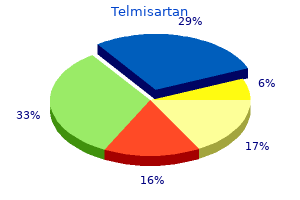
The plan is arrhythmia during exercise best order telmisartan, further pulse pressure 40 telmisartan 20mg generic, that all those who receive such scholarships or fellowships in science should be enrolled in a National Science Reserve and be liable to call into the service of the Government prehypertension forum order telmisartan once a day, in connection with scientific or technical work in time of war or other national emergency declared by Congress or proclaimed by the President blood pressure essential oils order telmisartan 80mg with amex. Thus, in addition to the general benefits to the nation by reason of the addition to its trained ranks of such a corps of scientific workers, there would be a definite benefit to the nation in having these scientific workers on call in national emergencies. The Government would be well advised to invest the money involved in this plan even if the benefits to the nation were thought of solely-which they are not-in terms of national preparedness. For more than 5 years many of our scientists have been fighting the war in the laboratories, in the factories and shops, and at the front. We have been directing the energies of our scientists to the development of weapons and materials and methods, on a large number of relatively narrow projects initiated and controlled by the Office of Scientific Research and Development and other Government agencies. Like troops, the scientists have been mobilized, and thrown into action to serve their country in time of emergency. But they have been diverted to a greater extent than is generally appreciated from the search for answers to the fundamental problems-from the search on which human welfare and progress depends. The mobilization of science behind the lines is aiding the fighting men at the front to win the war and to shorten it; and it has resulted incidentally in the accumulation of a vast amount of experience and knowledge of the application of science to particular problems, much of which can be put to use when the war is over. Fortunately, this country had the scientists-and the time-to make this contribution and thus to advance the date of victory. Security Restrictions Should Be Lifted Promptly Much of the information and experience acquired during the war is confined to the agencies that gathered it. Except to the extent that military security dictates otherwise, such knowledge should be spread upon the record for the benefit of the general public. Thanks to the wise provision of the Secretary of War and the Secretary of the Navy, most of the results of war-time medical research have been pub- 29 lished. Several hundred articles have appeared in the professional journals; many are in process of publication. The material still subject to security classification should be released as soon as possible. It is my view that most of the remainder of the classified scientific material should be released as soon as there is ground for belief that the enemy will not be able to turn it against us in this war. Most of the information needed by industry and in education can be released without disclosing its embodiments in actual military material and devices. Basically there is no reason to believe that scientists of other countries will not in time rediscover everything we now know which is held in secrecy. A broad dissemination of scientific information upon which further advances can readily be made furnishes a sounder foundation for our national security than a policy of restriction which would impede our own progress although imposed in the hope that possible enemies would not catch up with us. During the war it has been necessary for selected groups of scientists to work on specialized problems, with relatively little information as to what other groups were doing and had done. Working against time, the Office of Scientific Research and Development has been obliged to enforce this practice during the war, although it was realized by all concerned that it was an emergency measure which prevented the continuous cross-fertilization so essential to fruitful scientific effort. Ourabilitytoovercomepossiblefutureenemiesdependsuponscientific advances which will proceed more rapidly with diffusion of knowledge than under a policy of continued restriction of knowledge now in our possession. Need for Coordination In planning the release of scientific data and experience collected in connection with the war, we must not overlook the fact that research has gone forward under many auspices-the Army, the Navy, the Office of Scientific Research and Development, the National Advisory Committee for Aeronautics, other departments and agencies of the Government, educational institutions, and many industrial organizations. There have been numerous cases of independent discovery of the same truth in different places. To permit the release of information by one agency and to continue to restrict it elsewhere would be unfair in its effect and would tend to impair the morale and efficiency of scientists who have submerged individual interests in the controls and restrictions of war. A part of the information now classified which should be released is possessed jointly by our allies and ourselves. Plans for release of such information should be coordinated with our allies to minimize danger of international friction which would result from sporadic uncontrolled release. It should be competent to advise the Secretary of War and the Secretary of the Navy. It should, moreover, have sufficient recognition to secure prompt and practical decisions. To satisfy these considerations I recommend the establishment of a Board, made up equally of scientists and military men, whose function would be to pass upon the declassification and to control the release for publicationof scientificinformationwhichisnowclassified. Publication Should Be Encouraged the release of information from security regulations is but one phase of the problem. The other is to provide for preparation of the material and its publication in a form and at a price which will facilitate dissemination and use.
